Unit 11 第5课时(Section B 2a-2c) (同步课件)-七年级英语下册同步精品课堂(人教版)
文档属性
| 名称 | Unit 11 第5课时(Section B 2a-2c) (同步课件)-七年级英语下册同步精品课堂(人教版) | 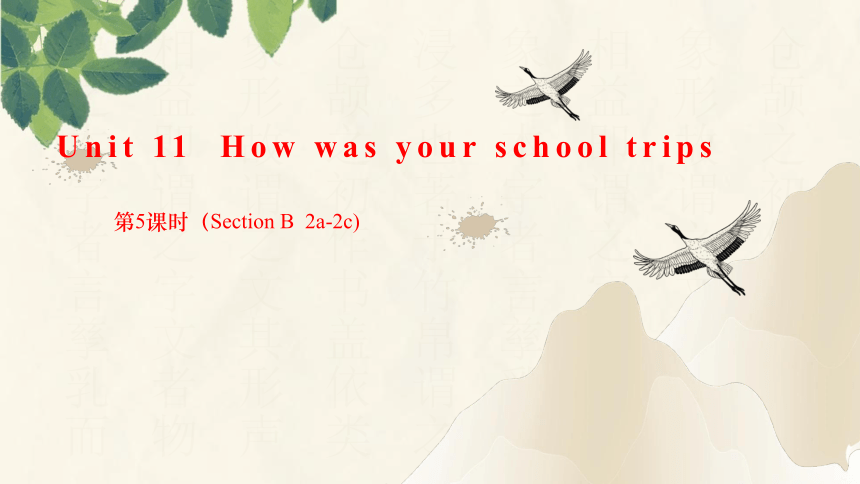 | |
| 格式 | pptx | ||
| 文件大小 | 4.6MB | ||
| 资源类型 | 试卷 | ||
| 版本资源 | 人教新目标(Go for it)版 | ||
| 科目 | 英语 | ||
| 更新时间 | 2024-04-14 12:10:44 | ||
图片预览

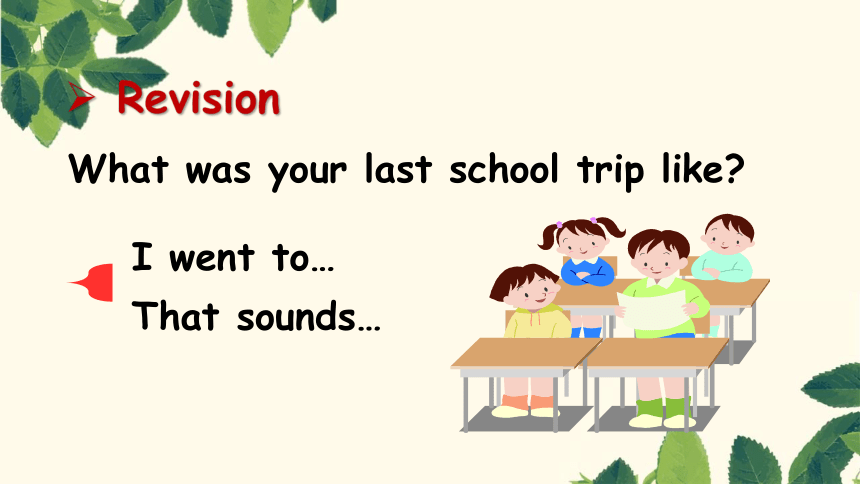
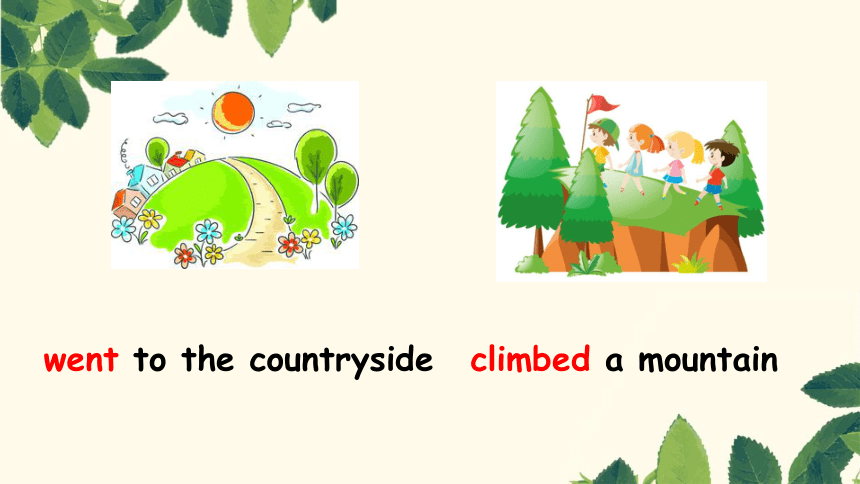
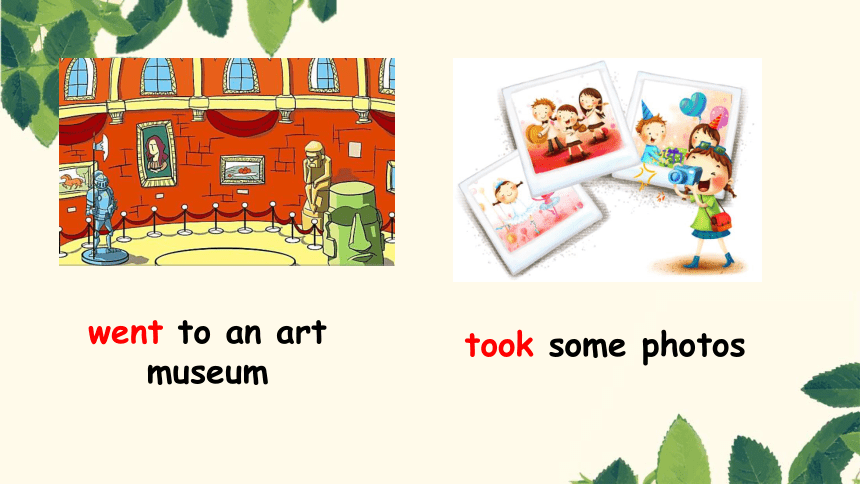
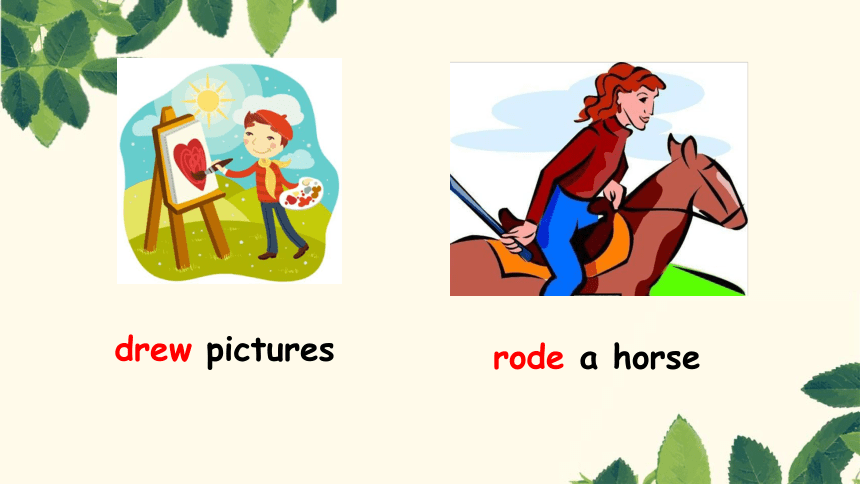
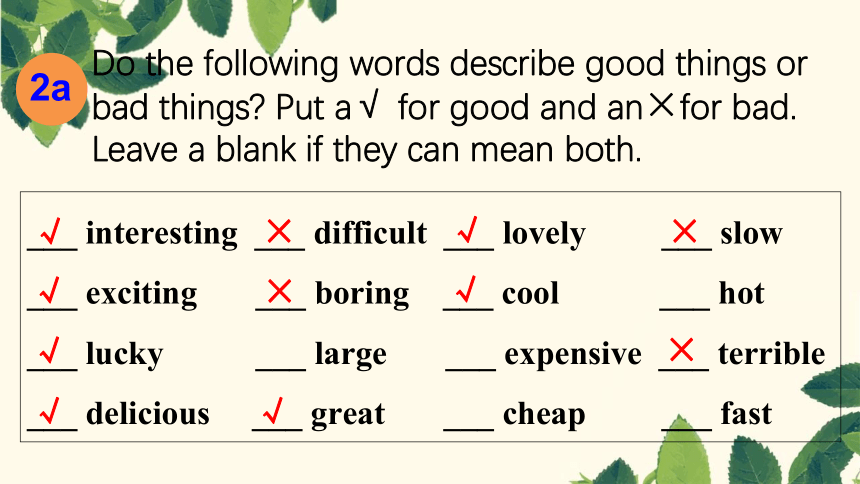
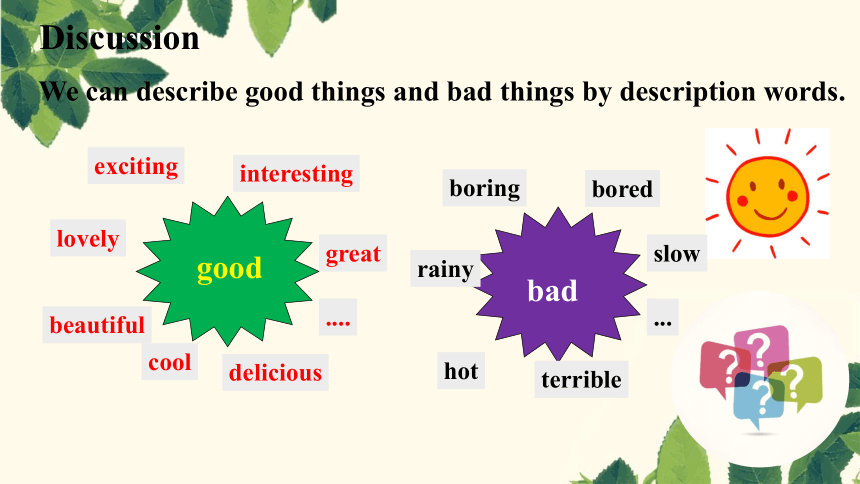
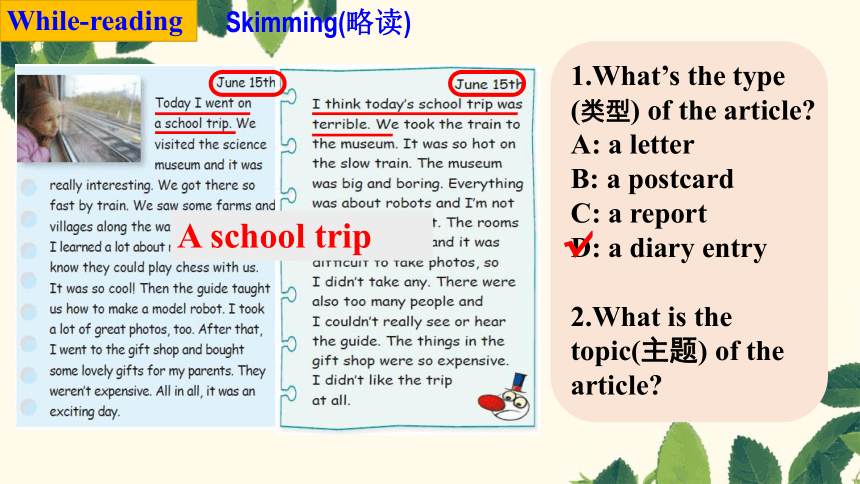
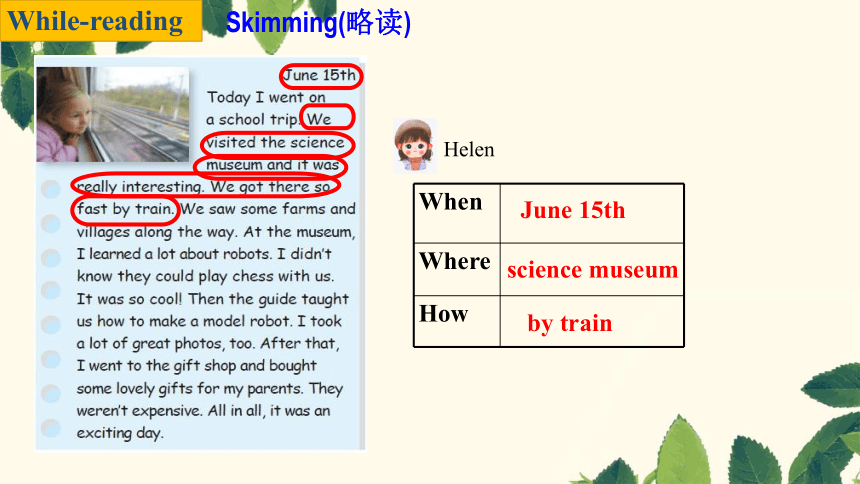

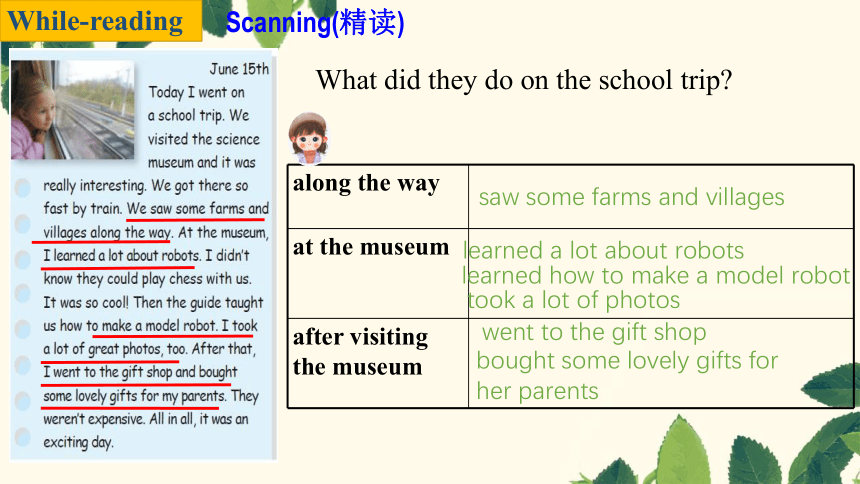
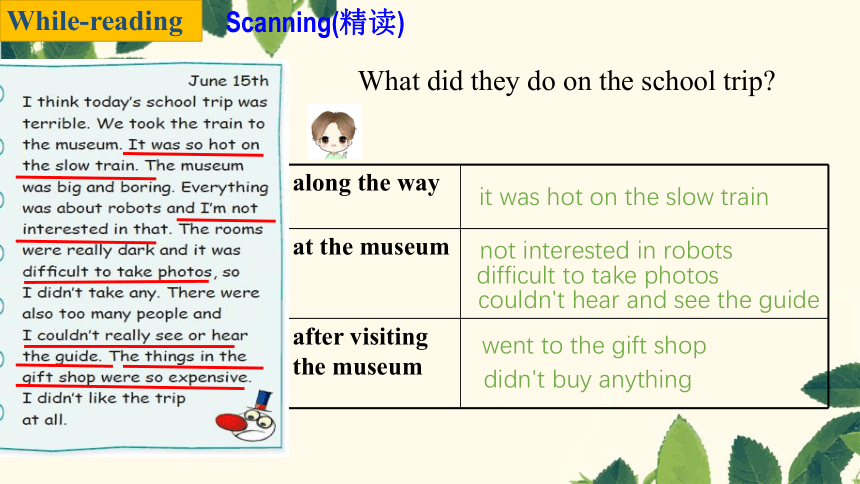
文档简介
(共35张PPT)
仓颉之初作书盖依类象形故谓之文其形声相益即谓之字文者物象之本字者言孳乳而浸多也著于竹帛谓之仓颉之初作书盖依类象形故谓之文其形声相益即谓之字文者物象之本字者言孳乳而
Unit 11 How was your school trips
第5课时(Section B 2a-2c)
What was your last school trip like
I went to…
That sounds…
Revision
went to the countryside
climbed a mountain
went to an art museum
took some photos
drew pictures
rode a horse
2a
Do the following words describe good things or bad things Put a√ for good and an×for bad. Leave a blank if they can mean both.
___ interesting ___ difficult ___ lovely ___ slow
___ exciting ___ boring ___ cool ___ hot
___ lucky ___ large ___ expensive ___ terrible
___ delicious ___ great ___ cheap ___ fast
√
×
√
×
√
×
√
√
×
√
√
Presentation
Discussion
We can describe good things and bad things by description words.
good
bad
exciting
interesting
lovely
cool
delicious
great
beautiful
boring
terrible
hot
rainy
bored
slow
...
....
While-reading
Skimming(略读)
1.What’s the type (类型) of the article
A: a letter
B: a postcard C: a report
D: a diary entry
2.What is the topic(主题) of the article
√
A school trip
While-reading
Skimming(略读)
When
Where
How
Helen
June 15th
science museum
by train
While-reading
Skimming(略读)
When
Where
How
Jim
June 15th
science museum
by train
While-reading
Scanning(精读)
along the way
at the museum
after visiting the museum
What did they do on the school trip
saw some farms and villages
learned a lot about robots
learned how to make a model robot
took a lot of photos
went to the gift shop
bought some lovely gifts for
her parents
While-reading
Scanning(精读)
along the way
at the museum
after visiting the museum
What did they do on the school trip
it was hot on the slow train
not interested in robots
difficult to take photos
couldn't hear and see the guide
went to the gift shop
didn't buy anything
While-reading
How do they feel about the school trip Why
It was exciting!
Reasons:
1. The museum was interesting.
2. The robots were cool.
3. The gifts were lovely and cheap.
While-reading
How do they feel about the school trip Why
It was terrible!
He didn't like it at all
Reasons:
1. The train was hot and slow.
2. The museum was boring.
3. The rooms were dark.
4. There were too many people.
5. The gifts were too expensive.
Post reading
farm buy cheap expensive interested fast chess slow excite train
On June 15th, Helen and Jim went to a science museum for school trip. They went there by _____. Helen thought it was_____, but Jim thought it was hot and_____. They saw some_____ and villages along the way. When they got there, they saw a lot of robots. They could play______ with us. However(然而),Jim didn't like robots, he was not__________in making model robots. Helen took lots of photos at the museum and she________ some lovely gifts at the gift shop. She thought they were________. For Jim, he thought it was too big and difficult to take photos. He didn't buy any gifts because he thought they were too __________. All in all, Helen had an__________ day, but Jim had a terrible day.
train
fast
expensive
slow
farms
chess
interested
bought
cheap
exciting
Complete the chart. How do Helen and Jim describe these things
Helen Jim
the trip
the train
the museum
the gift shop and gifts
exciting
fast
really interesting
lovely, not expensive
terrible
slow
big, boring, really dark, too many people
so expensive
2c
Passage structure
Helen’s trip
Feelings
Activities
interesting, exciting
by train→saw→learned a lot→how to make a model robot→took a lot of great photos→went to the gift shop→bought some lovely gifts
Jim’s trip
Feelings
Activities
terrible, didn’t like the trip at all
took the train→not interested in robots→didn’t take any… →
couldn’t really see or hear the guide
Read and retell the passage below.
Helen and Jim went on a school trip to the ________
museum on June 15th. Helen thought it was __________and _________. The train was ______. She learned _______ about ________. She also took a lot of _______. She bought some ______ . They were _____ and cheap. However, Jim thought it was _______ . It was so hot on the ______train. The museum was big and
science
interesting
exciting
fast
a lot
robots
photos
gifts
lovely
terrible
slow
_______. He was not __________ in robots. The rooms were really ______ and it was _________to take photos, so he didn’t take any. There were ________ people and he couldn’t see or hear the guide. The things in the gift shop were so _________. So he didn’t like the trip at all.
boring
interested
dark
difficult
too many
expensive
Language points
1. All in all, it was an exciting day.
1)all in all 总的来说;总之;整体上说
常用于句首,用来对所阐述的内容进行概括性总结及归纳。
All in all,you do well. 总的来说,你表现不错。
【拓展】
1) above all 意为首先;尤其是
Above all, he loves his work.
2) at all 意为全然,根本,用于否定句、条件句、疑问句等的句末。
It wasn't difficult to do at all.
3) after all 意为毕竟;居然;终究
After all, 15-minute exercise is better than nothing.
2)exciting adj. 使人兴奋的;令人激动的
【易混辨析】exciting与excited
exciting “使人兴奋的;令人激动的”,常用于修饰物,表示事物本身让人兴奋、激动。作定语和表语。作表语时,主语通常为物,强调事物所拥有的特征
The news is exciting.
excited “感到兴奋的”,常用于修饰人,表示人的主观感受。常作表语,主语通常是人,强调人的情绪
I am excited about the school trip.
I am excited to visit my cousin in Canada.
be excited about / at sth. 对某事感到兴奋
be excited to do sth. 感到兴奋去做某事
类似exciting与excited的词还有:
interesting 有趣的 interested 感兴趣的
relaxing 轻松的,放松的 relaxed 感到放松的
surprising 令人吃惊的 surprised 惊讶的
boring 令人厌倦的 bored 厌倦的
tiring 令人困倦的 tired 疲倦的
2. Then the guide taught us how to make a model robot.
然后,导游教我们怎样制作机器人模型。
1)【句式剖析】本句中how to make a model robot为“特殊疑问词 + 动词不定式”结构,在句中看作一个整体,作taught的直接宾语。
Then the guide taught us (how to make a model robot).
teach sb. sth.结构
2)guide n.导游;向导
The guide explained the history of the Great Wall to us.
导游向我们讲解了长城的历史。
【拓展】
1)guide作名词,还可表示“指南;指导手册;旅游指南”。
Follow our step-by-step guide.
跟着我们的分步指南去做。
2)guide还可作动词,意为“给某人领路;指引”。
He will guide you to the top of the mountain.
他将带领你们登上山顶。
The guide with a guide is guiding us through the forest.
那个拿着旅游指南的导游正领着我们穿越森林。
3. Everything was about robots and I’m not interested in that. 一切
都是关于机器人的,我对那方面不感兴趣。
1)everything pron. 所有事物;一切
everything是不定代词,作主语时,谓语动词用第三人称单数形式。
Everything goes well. 一切进展顺利。
It’s very important to make a plan before we do everything.
我们在做所有事情之前先制订一个计划是非常重要的。
2)be interested in 对……感兴趣
该结构中in为介词,其后接名词、代词或动词-ing形式作宾语。
He is interested in basketball. 他对篮球感兴趣。
Lisa is interested in singing and dancing. 莉萨对唱歌和跳舞感兴趣。
【拓展】interest作名词,意为“兴趣;关注”
Sth. is interesting. 某事很有趣。
take (an) interest in sth. 表示“对……有兴趣”。
have/show (an) interest in sth. 表示“ 对......有兴趣”。
I have an interest in film music. 我对电影音乐感兴趣。
【易混辨析】 interesting与interested
interesting 意为"有趣的",表示事物的性质特征。
This is an interesting story. 这是一个有趣的故事。
interested 意为"感兴趣的",表示人的主观感受。
He is interested in music.
他对音乐感兴趣。
4. There were also too many people and I couldn’t really see or hear the guide.
而且人太多,我真的看不见导游,也听不清导游说什么。
hear v. 听到;听见
【易混辨析】hear与listen
hear 及物动词 强调听的结果,其后直接接宾语。
I listened carefully, but heard nothing.
我仔细听了,但什么也没有听到。
listen 不及物动词 强调听的动作,其后跟宾语时要加介词to。
Boys and girls, please listen to me.
同学们,请听我说。
5. I didn’t like the trip at all. 我一点儿都不喜欢这次旅行。
not…at all 一点儿也不
not…at all表示强烈的否定意味。
Tom doesn’t like dancing at all. 汤姆一点儿也不喜欢跳舞。
【拓展延伸】not at all的用法:
1) 用来回答别人对你的感谢,意为“不客气,不用谢”。
—Thank you very much for lending me your bike. 非常感谢你借给我自行车。
—Not at all. 不客气。
2) 用来回答别人的歉意,意为“没关系”。
—I’m sorry, Mom. I broke the glass. 对不起,妈妈。我打破了玻璃杯。
—Not at all. Be careful next time. 没关系。下次小心。
6. I think today's school trip was terrible.
有些表示时间、距离、星球、世界、国家等无生命的东西的名词后加's来表示所有关系,叫做名词所有格。但如果名词以-s或-es结尾,则只在该名词后加' 来构成所有格。
① A ten miles' distance is far for me.
② The young man had a three hours' walk.
③ Beijing's streets are really busy.
1. Her uncle's office is about fifteen __________ (分钟)drive away from his home.
2. After two ______ (hour) walk, I'm so weak that I can't walk any further.
3. 在辛苦工作一周之后,我想通过音乐剧《猫》放松一下我自己。
_______________________, I want to relax myself by watching the musical Cats.
minutes'
hours'
After a week's hard work
一、单项选择
1. —Listen! Who is singing in the next room
—It must be Sally. I often hear her______ there.
A. singing B. sings C. to sing D. sing
2. At present, children mean to most parents in China.
A. everything B. nothing
C. anything D. something
Exercises
Exercises
3. There are trees on the hill.
A. too many B. too much
C. many too D. much too
4. — Did you watch the first match of the Russian World Cup
— Of course! We were so______ to watch the ______ match.
exciting; excited B. excited; excited
C. exciting; exciting D. excited; exciting
二、根据汉语意思完成英语句子, 每空一词
1. 你对英语感兴趣吗
you English
2. 你能告诉我如何制作机器人吗
Can you tell me a robot
3. 上个周末我们参观了博物馆。
We last weekend.
Are interested in
how to make
visited the museum
Exercises
二、根据汉语意思完成英语句子, 每空一词
4. 总之, 上周我很忙。
, I was very busy last week.
5. 他一点也不喜欢弹钢琴。
He like playing the piano .
All in all
doesn't at all
Exercises
仓颉之初作书盖依类象形故谓之文其形声相益即谓之字文者物象之本字者言孳乳而浸多也著于竹帛谓之仓颉之初作书盖依类象形故谓之文其形声相益即谓之字文者物象之本字者言孳乳而
谢君一赏
仓颉之初作书盖依类象形故谓之文其形声相益即谓之字文者物象之本字者言孳乳而浸多也著于竹帛谓之仓颉之初作书盖依类象形故谓之文其形声相益即谓之字文者物象之本字者言孳乳而
Unit 11 How was your school trips
第5课时(Section B 2a-2c)
What was your last school trip like
I went to…
That sounds…
Revision
went to the countryside
climbed a mountain
went to an art museum
took some photos
drew pictures
rode a horse
2a
Do the following words describe good things or bad things Put a√ for good and an×for bad. Leave a blank if they can mean both.
___ interesting ___ difficult ___ lovely ___ slow
___ exciting ___ boring ___ cool ___ hot
___ lucky ___ large ___ expensive ___ terrible
___ delicious ___ great ___ cheap ___ fast
√
×
√
×
√
×
√
√
×
√
√
Presentation
Discussion
We can describe good things and bad things by description words.
good
bad
exciting
interesting
lovely
cool
delicious
great
beautiful
boring
terrible
hot
rainy
bored
slow
...
....
While-reading
Skimming(略读)
1.What’s the type (类型) of the article
A: a letter
B: a postcard C: a report
D: a diary entry
2.What is the topic(主题) of the article
√
A school trip
While-reading
Skimming(略读)
When
Where
How
Helen
June 15th
science museum
by train
While-reading
Skimming(略读)
When
Where
How
Jim
June 15th
science museum
by train
While-reading
Scanning(精读)
along the way
at the museum
after visiting the museum
What did they do on the school trip
saw some farms and villages
learned a lot about robots
learned how to make a model robot
took a lot of photos
went to the gift shop
bought some lovely gifts for
her parents
While-reading
Scanning(精读)
along the way
at the museum
after visiting the museum
What did they do on the school trip
it was hot on the slow train
not interested in robots
difficult to take photos
couldn't hear and see the guide
went to the gift shop
didn't buy anything
While-reading
How do they feel about the school trip Why
It was exciting!
Reasons:
1. The museum was interesting.
2. The robots were cool.
3. The gifts were lovely and cheap.
While-reading
How do they feel about the school trip Why
It was terrible!
He didn't like it at all
Reasons:
1. The train was hot and slow.
2. The museum was boring.
3. The rooms were dark.
4. There were too many people.
5. The gifts were too expensive.
Post reading
farm buy cheap expensive interested fast chess slow excite train
On June 15th, Helen and Jim went to a science museum for school trip. They went there by _____. Helen thought it was_____, but Jim thought it was hot and_____. They saw some_____ and villages along the way. When they got there, they saw a lot of robots. They could play______ with us. However(然而),Jim didn't like robots, he was not__________in making model robots. Helen took lots of photos at the museum and she________ some lovely gifts at the gift shop. She thought they were________. For Jim, he thought it was too big and difficult to take photos. He didn't buy any gifts because he thought they were too __________. All in all, Helen had an__________ day, but Jim had a terrible day.
train
fast
expensive
slow
farms
chess
interested
bought
cheap
exciting
Complete the chart. How do Helen and Jim describe these things
Helen Jim
the trip
the train
the museum
the gift shop and gifts
exciting
fast
really interesting
lovely, not expensive
terrible
slow
big, boring, really dark, too many people
so expensive
2c
Passage structure
Helen’s trip
Feelings
Activities
interesting, exciting
by train→saw→learned a lot→how to make a model robot→took a lot of great photos→went to the gift shop→bought some lovely gifts
Jim’s trip
Feelings
Activities
terrible, didn’t like the trip at all
took the train→not interested in robots→didn’t take any… →
couldn’t really see or hear the guide
Read and retell the passage below.
Helen and Jim went on a school trip to the ________
museum on June 15th. Helen thought it was __________and _________. The train was ______. She learned _______ about ________. She also took a lot of _______. She bought some ______ . They were _____ and cheap. However, Jim thought it was _______ . It was so hot on the ______train. The museum was big and
science
interesting
exciting
fast
a lot
robots
photos
gifts
lovely
terrible
slow
_______. He was not __________ in robots. The rooms were really ______ and it was _________to take photos, so he didn’t take any. There were ________ people and he couldn’t see or hear the guide. The things in the gift shop were so _________. So he didn’t like the trip at all.
boring
interested
dark
difficult
too many
expensive
Language points
1. All in all, it was an exciting day.
1)all in all 总的来说;总之;整体上说
常用于句首,用来对所阐述的内容进行概括性总结及归纳。
All in all,you do well. 总的来说,你表现不错。
【拓展】
1) above all 意为首先;尤其是
Above all, he loves his work.
2) at all 意为全然,根本,用于否定句、条件句、疑问句等的句末。
It wasn't difficult to do at all.
3) after all 意为毕竟;居然;终究
After all, 15-minute exercise is better than nothing.
2)exciting adj. 使人兴奋的;令人激动的
【易混辨析】exciting与excited
exciting “使人兴奋的;令人激动的”,常用于修饰物,表示事物本身让人兴奋、激动。作定语和表语。作表语时,主语通常为物,强调事物所拥有的特征
The news is exciting.
excited “感到兴奋的”,常用于修饰人,表示人的主观感受。常作表语,主语通常是人,强调人的情绪
I am excited about the school trip.
I am excited to visit my cousin in Canada.
be excited about / at sth. 对某事感到兴奋
be excited to do sth. 感到兴奋去做某事
类似exciting与excited的词还有:
interesting 有趣的 interested 感兴趣的
relaxing 轻松的,放松的 relaxed 感到放松的
surprising 令人吃惊的 surprised 惊讶的
boring 令人厌倦的 bored 厌倦的
tiring 令人困倦的 tired 疲倦的
2. Then the guide taught us how to make a model robot.
然后,导游教我们怎样制作机器人模型。
1)【句式剖析】本句中how to make a model robot为“特殊疑问词 + 动词不定式”结构,在句中看作一个整体,作taught的直接宾语。
Then the guide taught us (how to make a model robot).
teach sb. sth.结构
2)guide n.导游;向导
The guide explained the history of the Great Wall to us.
导游向我们讲解了长城的历史。
【拓展】
1)guide作名词,还可表示“指南;指导手册;旅游指南”。
Follow our step-by-step guide.
跟着我们的分步指南去做。
2)guide还可作动词,意为“给某人领路;指引”。
He will guide you to the top of the mountain.
他将带领你们登上山顶。
The guide with a guide is guiding us through the forest.
那个拿着旅游指南的导游正领着我们穿越森林。
3. Everything was about robots and I’m not interested in that. 一切
都是关于机器人的,我对那方面不感兴趣。
1)everything pron. 所有事物;一切
everything是不定代词,作主语时,谓语动词用第三人称单数形式。
Everything goes well. 一切进展顺利。
It’s very important to make a plan before we do everything.
我们在做所有事情之前先制订一个计划是非常重要的。
2)be interested in 对……感兴趣
该结构中in为介词,其后接名词、代词或动词-ing形式作宾语。
He is interested in basketball. 他对篮球感兴趣。
Lisa is interested in singing and dancing. 莉萨对唱歌和跳舞感兴趣。
【拓展】interest作名词,意为“兴趣;关注”
Sth. is interesting. 某事很有趣。
take (an) interest in sth. 表示“对……有兴趣”。
have/show (an) interest in sth. 表示“ 对......有兴趣”。
I have an interest in film music. 我对电影音乐感兴趣。
【易混辨析】 interesting与interested
interesting 意为"有趣的",表示事物的性质特征。
This is an interesting story. 这是一个有趣的故事。
interested 意为"感兴趣的",表示人的主观感受。
He is interested in music.
他对音乐感兴趣。
4. There were also too many people and I couldn’t really see or hear the guide.
而且人太多,我真的看不见导游,也听不清导游说什么。
hear v. 听到;听见
【易混辨析】hear与listen
hear 及物动词 强调听的结果,其后直接接宾语。
I listened carefully, but heard nothing.
我仔细听了,但什么也没有听到。
listen 不及物动词 强调听的动作,其后跟宾语时要加介词to。
Boys and girls, please listen to me.
同学们,请听我说。
5. I didn’t like the trip at all. 我一点儿都不喜欢这次旅行。
not…at all 一点儿也不
not…at all表示强烈的否定意味。
Tom doesn’t like dancing at all. 汤姆一点儿也不喜欢跳舞。
【拓展延伸】not at all的用法:
1) 用来回答别人对你的感谢,意为“不客气,不用谢”。
—Thank you very much for lending me your bike. 非常感谢你借给我自行车。
—Not at all. 不客气。
2) 用来回答别人的歉意,意为“没关系”。
—I’m sorry, Mom. I broke the glass. 对不起,妈妈。我打破了玻璃杯。
—Not at all. Be careful next time. 没关系。下次小心。
6. I think today's school trip was terrible.
有些表示时间、距离、星球、世界、国家等无生命的东西的名词后加's来表示所有关系,叫做名词所有格。但如果名词以-s或-es结尾,则只在该名词后加' 来构成所有格。
① A ten miles' distance is far for me.
② The young man had a three hours' walk.
③ Beijing's streets are really busy.
1. Her uncle's office is about fifteen __________ (分钟)drive away from his home.
2. After two ______ (hour) walk, I'm so weak that I can't walk any further.
3. 在辛苦工作一周之后,我想通过音乐剧《猫》放松一下我自己。
_______________________, I want to relax myself by watching the musical Cats.
minutes'
hours'
After a week's hard work
一、单项选择
1. —Listen! Who is singing in the next room
—It must be Sally. I often hear her______ there.
A. singing B. sings C. to sing D. sing
2. At present, children mean to most parents in China.
A. everything B. nothing
C. anything D. something
Exercises
Exercises
3. There are trees on the hill.
A. too many B. too much
C. many too D. much too
4. — Did you watch the first match of the Russian World Cup
— Of course! We were so______ to watch the ______ match.
exciting; excited B. excited; excited
C. exciting; exciting D. excited; exciting
二、根据汉语意思完成英语句子, 每空一词
1. 你对英语感兴趣吗
you English
2. 你能告诉我如何制作机器人吗
Can you tell me a robot
3. 上个周末我们参观了博物馆。
We last weekend.
Are interested in
how to make
visited the museum
Exercises
二、根据汉语意思完成英语句子, 每空一词
4. 总之, 上周我很忙。
, I was very busy last week.
5. 他一点也不喜欢弹钢琴。
He like playing the piano .
All in all
doesn't at all
Exercises
仓颉之初作书盖依类象形故谓之文其形声相益即谓之字文者物象之本字者言孳乳而浸多也著于竹帛谓之仓颉之初作书盖依类象形故谓之文其形声相益即谓之字文者物象之本字者言孳乳而
谢君一赏
同课章节目录
- Unit 1 Can you play the guitar?
- Section A
- Section B
- Unit 2 What time do you go to school?
- Section A
- Section B
- Unit 3 How do you get to school?
- Section A
- Section B
- Unit 4 Don't eat in class.
- Section A
- Section B
- Unit 5 Why do you like pandas?
- Section A
- Section B
- Unit 6 I'm watching TV.
- Section A
- Section B
- Review of Units 1-6
- Unit 7 It's raining!
- Section A
- Section B
- Unit 8 Is there a post office near here?
- Section A
- Section B
- Unit 9 What does he look like?
- Section A
- Section B
- Unit 10 I'd like some noodles.
- Section A
- Section B
- Unit 11 How was your school trip?
- Section A
- Section B
- Unit 12 What did you do last weekend?
- Section A
- Section B
